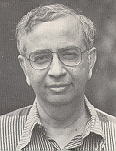Ammar Siamwalla
Ammar Siamwalla | |
|---|---|
 Ammar Siamwalla | |
| Born | May 29, 1930 |
| Nationality | Thai |
| Education | Harvard University |
| Occupation | Economist |
Ammar Siamwalla (Template:Lang-th; RTGS: Amman Sayamwala) is one of Thailand's most prominent economists. His ancestors were Indians who immigrated and founded a local stationary business, D.H.A. Siamwalla.
Education
Ammar attended St. Paul's School, Darjeeling in India, he went on to receive a BSc in economics from the London School of Economics and a PhD in economics from Harvard University. His teachers at Harvard were Alexander Gerschenkron, Wassily Leontief and Edward Chamberlin among others.
Career
He began his career as an assistant professor and research staff economist at the Department of Economics, Yale University before moving to the Faculty of Economics of Thammasat University as a Rockefeller scholar at the advice of Puey Ungpakorn who was then dean of faculty. Like Puey and other scholars, Ammar left Thammasat after the October 6, 1976 student massacre in Thammasat University.
He was a visiting professor at the Food Research Institute of Stanford University as well as a research fellow with the International Food Policy Research Institute in Washington, D.C.
He has been active at the Thailand Development Research Institute (TDRI) as a program director for agriculture and rural development, and as president of TDRI in 1990-1995.
Ammar is an expert in Thai rice, Thai agricultural economics, and development economics. As one of the first Thai trained in neoclassical economics, he has contributed considerably in the development of the modern economic discipline in Thailand.
Currently, he holds a post as a distinguished scholar of TDRI. He is still active in the economic debates and periodically gives commentaries to the public. He is known to be a harsh critic of former Prime Minister Thaksin's populist policies.
